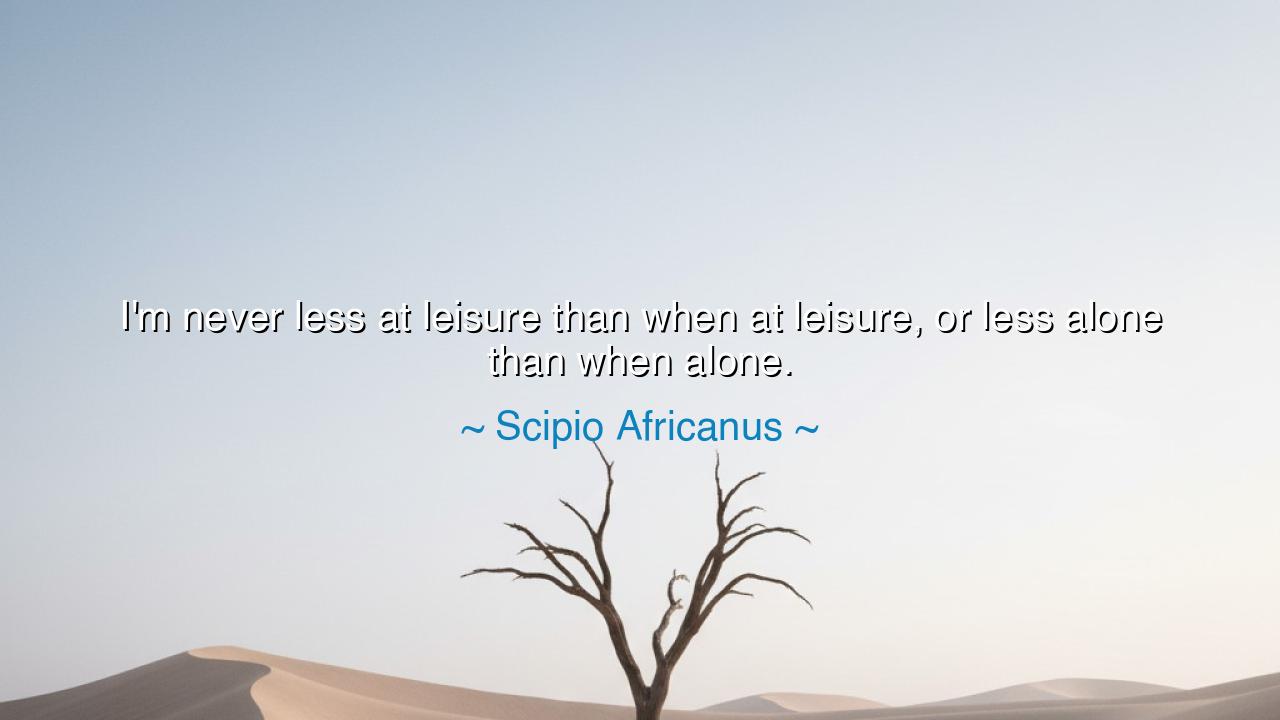
I'm never less at leisure than when at leisure, or less alone






"I'm never less at leisure than when at leisure, or less alone than when alone." These words by Scipio Africanus, one of Rome’s greatest generals, speak to the complexity of the human spirit and the profound understanding of solitude and time. Scipio’s remark is not a simple declaration of his own busy nature but a reflection on the paradox of inner peace and personal reflection. In a world where leisure and solitude are often equated with rest and escape, Scipio reveals that true rest comes not from simply being alone or having free time, but from the mind’s ability to find peace and clarity amidst the noise of life. True leisure, he suggests, is not the absence of activity but the presence of purposeful stillness.
In the ancient world, solitude was often revered, not as a form of escape, but as an opportunity for the philosopher or the warrior to confront themselves and to cultivate wisdom. Socrates, for example, famously said that "an unexamined life is not worth living." His practice of solitude was not about avoiding others, but about engaging deeply with his own soul, finding peace in his thoughts and reflecting on the mysteries of life. The ancient sages understood that true leisure is not about external relaxation, but about internal peace and the ability to engage with the mind free from distractions.
Scipio Africanus was a leader in a time of great conflict and strife, and his life was marked by constant battles and political intrigues. Yet, even in the thick of war, Scipio knew that the key to true leadership was not just in commanding troops or securing victories, but in finding moments of inner stillness where he could reflect and find his center. His battles against Hannibal in the Second Punic War were not won through sheer strength alone but through his ability to remain calm, focused, and strategic amidst the chaos. In the same way, his remark on leisure speaks to the need for a clear mind and a peaceful soul, even in the busiest and most tumultuous times.
Consider the life of Alexander the Great, another legendary figure whose accomplishments were built not just on physical prowess but on the clarity of mind he cultivated through reflection. Alexander’s campaigns spanned across continents, yet he often retreated to moments of solitude to reflect on the meaning of his conquests and the future of his empire. Even in the midst of his greatest victories, he sought quiet moments of introspection, understanding that to lead with wisdom, one must look inward. Like Scipio, Alexander understood that to be truly at leisure—to be truly at peace—was not about escaping the world but about finding a deeper sense of purpose in it.
Scipio's quote speaks to the depth of the human experience. It highlights the idea that rest is not always about physical relaxation, but about the mental space we create for ourselves to process and reflect. The mind, when overburdened with distractions or obligations, can never truly rest, no matter how much time it has. True leisure, then, comes when the mind finds its purpose and its clarity—even in the midst of what seems like idle time. This is the paradox Scipio presents: when we are alone with ourselves, when we have the time to reflect, we often find that the quiet reveals more than we expected—both our strengths and our weaknesses, our hopes and our fears.
The lesson from Scipio’s words is one of self-mastery and mindfulness. It teaches us that solitude and leisure are not merely about escaping the demands of life but about taking the time to engage in deep self-reflection, to recharge the soul and the mind so that we can act with greater wisdom and clarity. We are not truly at peace when we are only physically alone or idle—we are only at peace when our minds are free from the burden of restlessness. The challenge, then, is to find stillness within ourselves, no matter the circumstances around us.
In our own lives, we can take Scipio’s wisdom to heart. We must cultivate leisure that is not mere escapism but a pause for deep reflection. When we are faced with the demands of life, we should create moments of solitude where we can reconnect with our deeper sense of purpose and clarity. True leisure is not about running away from our responsibilities but about finding peace in them, recognizing that stillness within leads to strength in action. So, let us seek to be at leisure not just in our circumstances, but in our minds, and may that peace guide us in everything we do.






AAdministratorAdministrator
Welcome, honored guests. Please leave a comment, we will respond soon